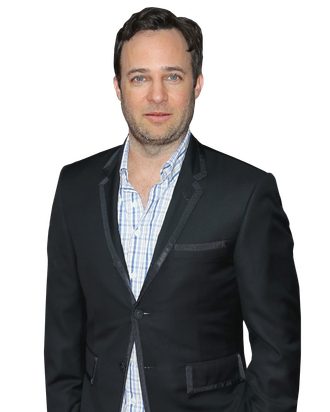
Before he became the co-creator of Fox’s breakout hit Empire, alongside Lee Daniels, Danny Strong was an actor, probably best known for his role as the nebbishy Jonathan Levinson on Buffy the Vampire Slayer. Realizing there are limits to the careers of Jonathan Levinson types, Strong turned to screenwriting, beginning with Recount, an HBO movie about what went down in Florida after the 2000 presidential election. Today he’s become one of the most successful writers in Hollywood (see his Emmy for Game Change and his credits on the final two Hunger Games movies), and now he’s directing episodes of Empire, too. Strong spoke to Vulture about addressing social issues through television, how Game of Thrones has influenced Empire, and why Cookie is like Kramer.
Did you grow up watching Dynasty?
No … I think what drew Lee [Daniels] to it was that I really hit that the middle son who’s gay is the one who should inherit the empire. But his father is so homophobic, he hates him for it. I knew that was Lee’s relationship with his father. So I hit that hard to try and land Lee.
I wanted to deal with social issues in everything I work on. It’s so hard and time-consuming to write anything, so I want what I’m working on to have some deeper meaning. I think why a writer writes is to talk about subject matter that needs to be addressed in society, but also, I think it makes it better. It makes a better drama when you’ve got weighty subject matter at the core because it makes it richer and deeper, and when something’s richer and deeper, it gets to be funnier. That’s why Lee and I like working with each other — we like things that are dramatic and funny at the same time, and also that have depth to them. Everyone’s like, “You guys are such opposites, and it’s crazy,” but artistically, that’s what we like doing. That’s ultimately why this partnership has worked out, because we value the same thing in story.
How much of Lee is in Cookie?
There are elements. There are elements in Lucious. There are elements of Cookie in Lee, and there are elements of Jamal in Lee. There are elements of Andre in me. I am Hakeem. I love that character, and I love Yaz [Bryshere Y. Gray], who plays him. I find him endlessly entertaining. This season is going to be a great Hakeem season, too.
He always makes me think of Justin Bieber.
Bieber was a prototype for Hakeem.
You wrote the episode where Lucious told Andre he didn’t trust him for marrying a white woman. How did you come up with that?
People ask me all the time about being a white writer writing this show, and the truth is, moments like that don’t come from research. They come from an instinct of how this character would feel about this. It feels truthful and honest, and it seems to me that a character like Lucious would, at the end of the day, feel that way about his son. There’s something universal about it, but it doesn’t come from anything other than me being lost in the scene. That whole riff about the white wife, I’ll tell you exactly where that came from.
We had come up with this plot of Andre trying to get this position as interim CEO if the CEO were to be incapacitated. The plot ends with Lucious voting against Andre, and it’s a twist, right? What I realized was that it didn’t really make sense why Lucious was voting against him. So I was staring at the page. I’m like, “What am I going to do?” “Oh, I’ll make this about character instead of some plot twist, because these machination plot twists I’m coming up with are stupid. They just feel corny and cheap.” And I thought, Oh, it’s because he doesn’t trust Andre because he married a white woman, and because Andre wants to assimilate. So it was a way of me trying to get myself out of this story corner by digging deeper into character in a way that felt completely truthful. In the studio, everyone had a problem with it in the final cut. They felt as if it had come out of nowhere, and people were actually trying to get me to take it out. I said, “No, the fact that it comes out of nowhere is what makes it so powerful.” It puts the idea in our own heads that Lucious has been stewing about this since the moment he met her, but it’s never been discussed.
Is there often conflict with Fox?
They sort of embraced that this was what we were going to do. It wasn’t as if we were a square peg in a round hole when we were developing this. One of the reasons the show has popped the way it has is because there’s a certain fearlessness in what we’re up to, storytelling-wise, and to put that in the confines and the restrictions of a network show is incredibly cool.
Plus the music.
When we were editing those first few episodes, anytime I felt as if there was a moment where the show was going to drag, a musical number would come in. We’re so fortunate we have such killer songs. Sanaa Hamri is a huge part of that because of her background in the music industry. She directed music videos and has toured with Mariah Carey and Prince, and one of the reasons we hired her as our supervising director is because of this background. She oversees the music with Timbaland and our other writers. We have Swizz Beatz and Ne-Yo this season. She is a huge part of that.
What TV influences you?
At its core, we talk about Game of Thrones a lot in the writer’s room.
Have you read those books?
No, and I don’t actually watch the show. But most of our staff watches the show, and I’ve seen the show, but it’s to infuse that “kingdoms at war” idea. The Lion in Winter was a big inspiration. One of the things I love about The Lion in Winter is that it’s a battle for the kingdom, but it’s a soap opera. There’s this soap-opera quality of them all fighting, squabbling, and being petty.
Do you have any musical talent yourself?
No, no, zero. I think nothing I’ve ever written about has anything to do with me. If I wanted to write about myself, it would all be about an actor annoyed that he didn’t get the audition. It would not be very interesting because that was my life for 15 years. I think I started writing to get my mind off of that.
Lee Daniels told me that part of his attraction to making Empire was that his friend Whitney Cummings told him how much money she made in TV.
Everyone in our business wants to be successful. Part of the fun of Lee is he’ll just say whatever is on his mind. He has no filter and is totally uncensored, and the press really digs it up because most people in the entertainment industry are guarded. Lee is the exact opposite. He just says whatever he wants, and as his collaborator, it’s sometimes very entertaining, and sometimes, you know. But I made a rule many years ago that I’m just not going to comment on things Lee says publicly, because if I did, I probably wouldn’t have time to do anything else.
He’s fun to talk to. I think he’s watching how you, the listener, will react.
He’s very entertaining. Sometimes it’s really calculating. Sometimes he’s just talking. One of the things I’m a fan of with him is his fearlessness. He will go anywhere, and that’s a great thing in film and television. A lot of people are very fear-driven.
Did it surprise you that Cookie turned out to be such a cultural icon?
No, I kind of knew when I pitched the show to Lee. He came up with the name Cookie. I pitched her as Mama Rose on crack. I said, “And there’s going to be this mom who’s like Mama Rose on crack,” and Lee started screaming, “Yes, darling, yes.” I always knew she would be the heart of it, so I thought, Oh, this this Mama Rose character is going to really pop if we cast the right actress.
Taraji P. Henson is that.
I view her as Fonzie, or Kramer from Seinfeld. Cookie is this amazing alchemy of the character, the writing, and then the actress that has been hired to play her.
And Lucious Lyon?
Terrence Howard is amazing on our show. Those moments with his children when he’s a real father to them are my favorite moments because he’ll stab them in the back in a heartbeat. I love them all. I love all the characters.


